December 9, 2019
The Whitefish Review Interview:
Huey Lewis
In one of the most introspective and in-depth interviews of his career, Lewis spoke with Whitefish Review editors about his struggles with hearing loss, his awakenings and his teachers across his life—and the energy your creative ventures bring you when you keep walking your own path. Plus… we have to start with a little fishing.
Interview by Brian Schott, Mike Powers & Ryan Friel
Over the past forty years, Huey Lewis & The News have sold thirty million records, won a Grammy, and been nominated for an Academy Award. They have also just released their first new song in over a decade. “Her Love Is Killin’ Me” will appear on the band’s forthcoming album, expected to arrive in 2020.
This and other new songs came right on the brink of Lewis’ sudden 2018 Ménière’s disease diagnosis—a rare ear disorder—which suddenly ended Huey’s touring career. Even at age 68 he was still performing 75 times a year with his band.
Along with the new record, Lewis has been continuing to work on his musical The Heart of Rock & Roll, which opened to rave reviews in San Diego last fall, with sights for even bigger stages.
After a planned phone interview with Ryan Friel, Mike Powers and Brian Schott was canceled due to Huey’s fluctuating hearing, Powers and Schott traveled to Missoula to meet and speak with him in person. Friel called in for a quick and energetic hello, prior to taking off on a floatplane for another day of guiding in the wilds of King Salmon, Alaska.
The wide-ranging conversation covered fly-fishing and conservation, Lewis’s struggles with hearing loss, a look back on his career, and his outlook for the future. They spoke for over two hours. Lewis was full of energy and vigor—no “old man” to be found.
Sept. 9, 2019
Conference Call Line
Huey Lewis: Hey, guys. Huey Lewis here.
Ryan Friel and Mike Powers: Huey!
Brian Schott: Hey, Huey, it’s Brian in Whitefish here.
HL: Oh, shit. Okay, hang on. You know what? I can already tell. I’m going to have to call you back. I tried to Bluetooth through my hearing device and it’s not working. But I have other means. I’m going to have to hang up and try it again.
BS: Okay, no problem. [Huey leaves the call]
RF: You guys there?
MP & BS: Yep.
RF: Interview’s over. Christmas is canceled. I’m out. [laughter]
BS: Wow, that’s just hard. Hearing someone struggle. You know, with the basics?
MP: Wow, yeah. I take everything for granted. I don’t know how you learn not to. Living mindfully I guess.
[Huey calls back in.]
HL: Gentlemen. I’m trying. Can you hear me?
RF: Yeah, we can hear you well, Huey!
HL: Oh, man. I can’t hear you at all.
BS: We could try to switch out of this conference line and—
HL: Why don’t we just meet in Missoula?
BS: Okay. We’d like to do that. When can you do it?
HL: Anytime. I have to go to the Bay Area on Wednesday, but I live here. I’m here all the time. Any time. And here’s the thing. My hearing fluctuates so, it’s weird. I’m in a real bad spell right now, but I just came out of 26 days of being pretty good—when I could have heard you much easier. I just can’t right now.
BS: No sweat. All the better for us. We’ll come down and say hi and have Ryan call in.
HL: That’s awesome. I’m sorry, guys. It is what it is. I’m an old man and it’s all going to shit. See ya, boys.
[Two weeks later, Brian and Mike meet Huey in Missoula at Fact & Fiction, the legendary independent bookstore on Higgins Avenue. Unfortunately, the timing is bad for Ryan with his Alaska guiding job.]
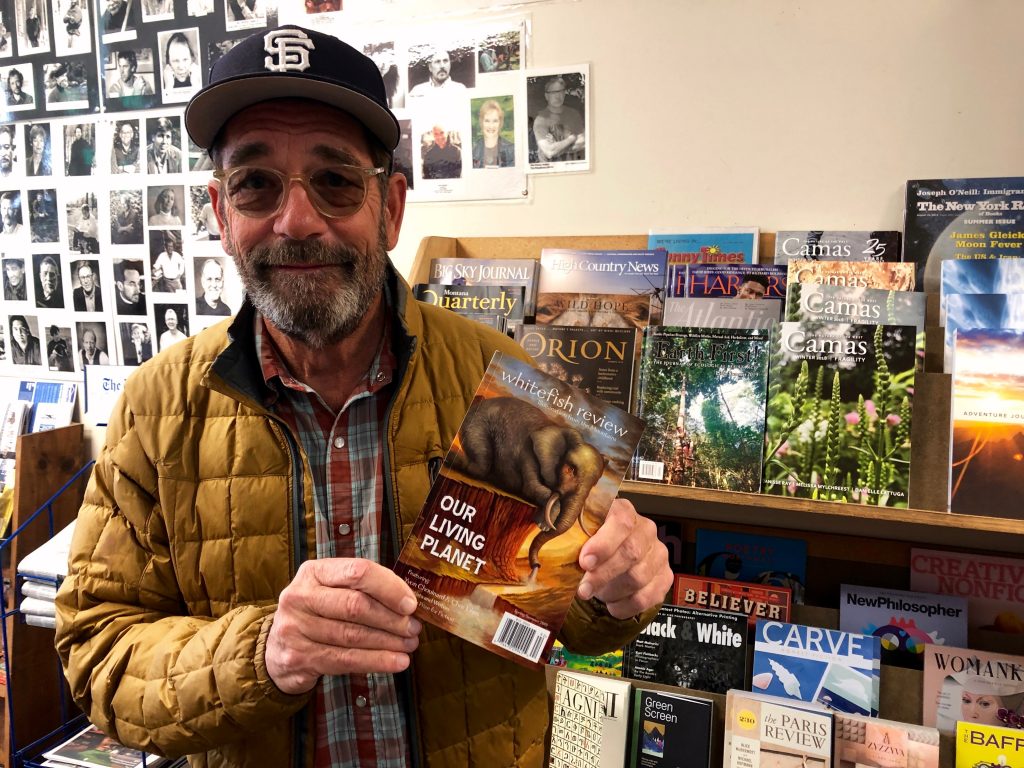
Brian Schott: Hi Huey, it’s Brian. [shaking hands]
Huey Lewis: Nice to meet you. And you’re Mike?
Mike Powers: Nice to meet you. [another handshake]
HL: Good to meet you. I can almost hear you. [laughing] My hearing is really bad today, again.
MP: Not a good day?
HL: Unfortunately, no. It’s as bad as it was when we were on the phone. And, it got better between then and now—and then went to shit again. Go figure. But, I have my hearing devices turned on, and I CAN hear you. What’s the guy in Alaska’s name?
BS: Ryan. He’s going to call in a second. He’s just about to jump on a floatplane, but he’ll get a kick out of saying a quick hello again while we are here. Have you fished Alaska?
HL: I’ve never fished Alaska. I’m a dry fly snob. And there’s not a lot of dry fly fishing in Alaska. That’s my little personal axe to grind—the resource.
THE RESOURCE & A CONTROVERSY
HL: This all started for me at our “Mitchell Ditch” pissing match. [Lewis had a case that eventually went to the Montana Supreme Court in 2008 over whether public access should be allowed on the “stream” near his home (Mitchell Slough). Montana’s Stream Access law permits anglers to access Montana waters from any public right-of-way.]
We bought a place that had an irrigation ditch, that was clearly an irrigation ditch—at its best, Class 2 water as the Stream Access Law defines it—which is water that is not subject to the Stream Access Law. When a few of us moved there, we were labeled “rich out-of-staters.” Now, this is 30 years ago—I’ve been here 32 years—and we were a perfect target. It became cause celeb to go after these “rich guys” and they painted this picture of us coming in, buying property with public water, and fencing the public off from the water. Which was a lie.
But they repeated it enough times. And this thing went to Conservation District, where we won it. They said, you’re right. It’s a ditch. Then it went to District Court, where they studied it for two years and said, it’s a ditch. Then they went to State Supreme Court who sent it back to District Court. They redid it again. This whole process took 20 years—but eventually, it got back to the State Supreme Court, which is a very political body. And they went, hey—we don’t care what it is. There’s fish in there. We’re going to let the public at it.
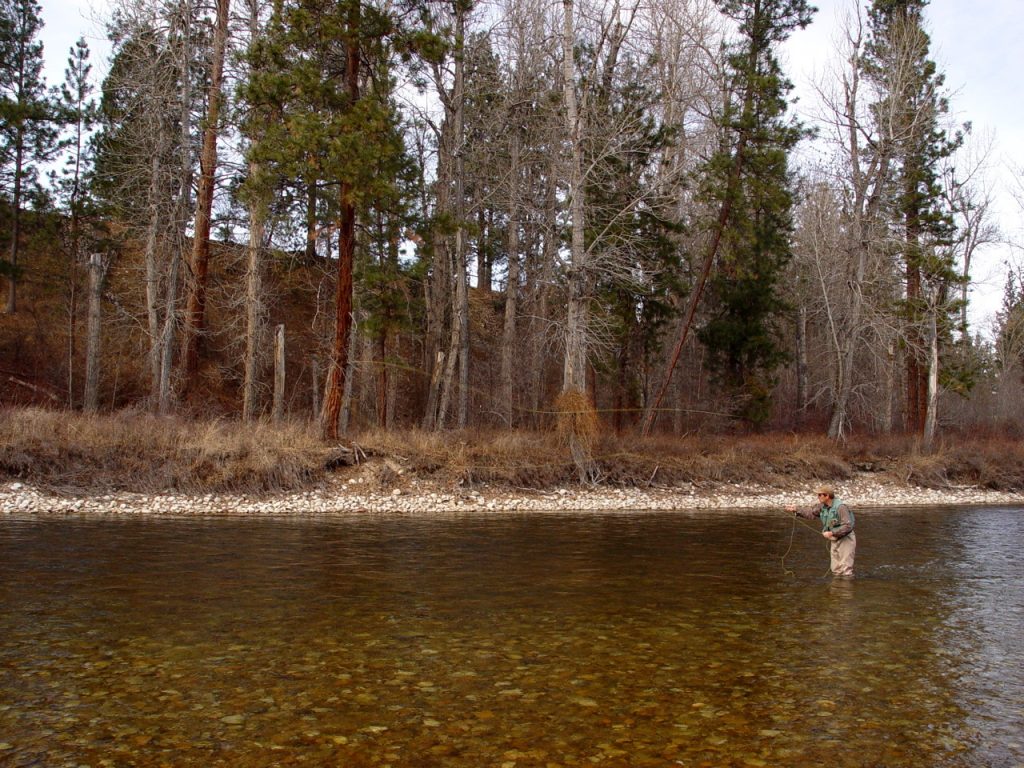
And so consequently, it’s been six years now since it’s been public. And now the resource has been decimated. It’s like 10 percent of the fishery it used to be. And when they first opened it to the public, we had all kinds of fishermen coming down there and crappy regulations. You know—you can fish with treble hooks and Rapala’s down there. And now, five years down the line, it’s completely silted in.
See, the thing about the Mitchell is that it has no gradient. So you have to scour it with equipment and clean it and maintain it and stick logs in. Trout need cover and they need clear, cold water. And they don’t need San Juan worms in their face every five seconds. We created this sanctuary. This fishery was alive. And immediately upon it going public, now we can’t work on it. You can’t maintain it, and it’s stilted in like crazy. And the fish are disappearing. And now we don’t have fishermen. And so what happened is the landowner lost, the resource lost, and now even the public lost because there’s no fish in it. That was a horrible thing.
And so when that happened to me, I re-dedicated myself to these little battles for the resource. The policies from on high are too access oriented. They don’t consider the resource enough. Policy should start with the resource.
RF: Huey, this is Friel. I have to run in a moment, but have you heard of the Pebble Mine? It has the largest gold deposits in the world, but they want to dig this huge mine at the headwaters of the richest salmon fishery in the world. [Pebble Mine is proposed to be an open-pit mining operation that would cover an area larger than Manhattan.]
HL: I don’t know about that specifically, but I know that salmon are in terrible shape, as well as steelhead. I go steelhead fishing up there in BC every year and I’m lucky if I catch a fish a day. I’m up there for six days; I catch four or five fish. Wow. That’s tough.
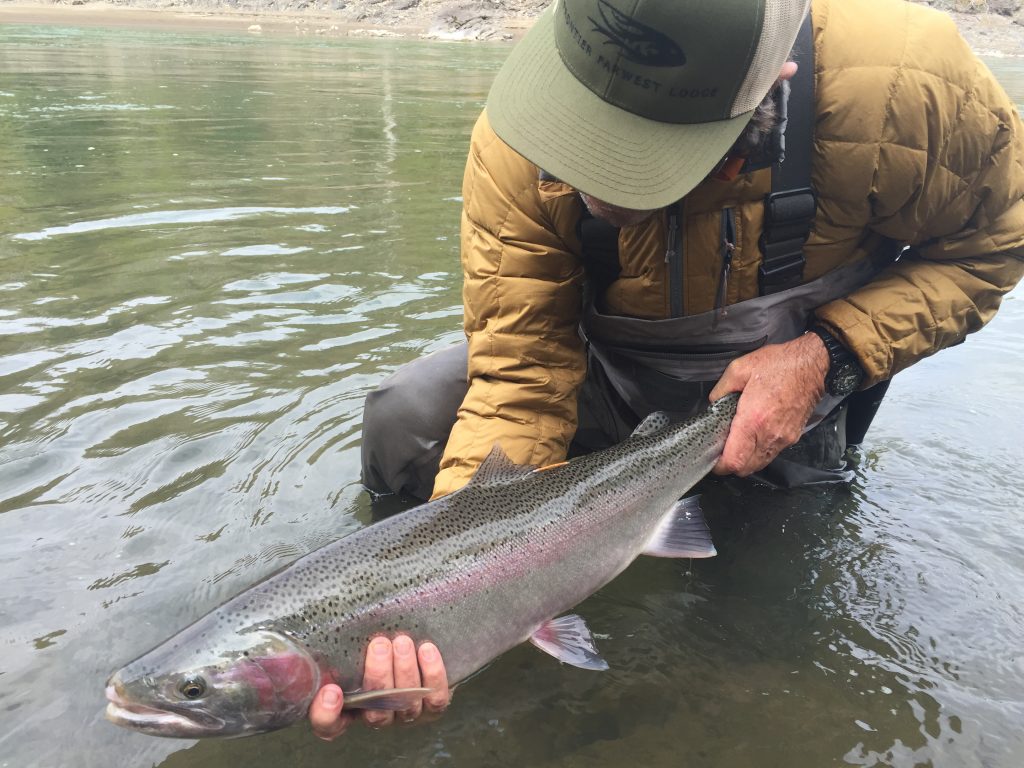
RF: Climate change is definitely affecting our cold-water aquatic friends. But hey guys, I have to go pick up my next group. Sorry, I gotta run!
HL: Take care, Ryan.
MOVING TO MONTANA
BS: So let’s talk more about Montana, Huey. What brought you here?
HL: Well, fly fishing initially. I have fly fished all my life. The first band I was in, I came to Montana with one of the other band members. We were traveling to the Weiser Fiddle Convention in Idaho and went north and fished our way to the Bitterroot. When I saw the valley I just went, “Wow, that is spectacular!” I fell in love with it. And, you know, it’s kind of a funny story, but I turned 30 years old with $300 to my name. But I had a hit. I had my first hit. [“Do You Believe in Love” (1982)] I didn’t have a penny, but I had a hit.
And so finally I made a little bit of money and I remember the first thing I did was invest in some kind of limited partnership apartment scheme that a money guy had proposed and somebody introduced me to and it came very well recommended because the tax laws were friendly. And the idea was you bought this place and you got a big tax write off for it. And then you sell it a couple years later and make more money that way and so on. But of course, as soon as I bought it, they disallowed the tax advantages. And now, it wasn’t worth anything and I lost my money.
It wasn’t a lot of money, but it was the first money I had earned. And I thought, damn, you know what, I’m not going to do that anymore. You know what I’m going to do? I’m going to buy a piece of ground in Montana. That’s the only thing I’ve always wanted. That’s what I’m going to do. And that’s pretty much what I’ve done. I bought one parcel and then I bought a couple others and I’ve been rehabbing them. Putting parcels together and getting rid of fences, getting rid of car bodies, and cleaning stuff up. I mean, I love that. Fencing cows off of the ditches and allowing the habitat to grow up.
MP: And see the impact.
HL: And it’s not just fish, it’s ducks and geese and pheasant. And we have quail in our valley now. They’re established. And dove and sandhill cranes and elk. We have a couple herds of elk in the river bottom now. So it has really changed. I’ve been here now 32 years and we never had elk in the river bottom. We never had elk. We never had quail. We never had wild turkeys. And now we have all three.
Why are the elk in the river bottom? Everybody wants to know. Is it the wolves? Maybe? Or is it those wonderful alfalfa fields? One thing that’s nice about the Bitterroot Valley is the corridor right down the river is pretty much big ranches, conservationist ranches. And most are contiguous. So, we have a very nice corridor. Without almost no fences. And that’s really good for wildlife.
BS: So is a typical day in the life of Huey Lewis working on the land?
HEARING LOSS
HL: You know, the worst thing is, I lost my hearing, right? This is now a year and eight months, and it’s awful. I can’t hear music. It’s hard enough to hear speech. But music is impossible. The music is cacophony for me and now my hearing fluctuates. I can actually get better sometimes where I think, ‘Oh my gosh, I can almost sing.’ And I have sung twice in the last two years when my hearing was better. And I sang one song acoustically. But I couldn’t do it for a set. And anyway, the point is moot because if I book a gig, I have to book it a month in advance. And I don’t know what’s going to happen a month from now. So that’s the hard part.
So I can’t work and I miss that. I miss the guys. The camaraderie and the fun thing we had. I don’t miss doing five shows a week. I don’t miss traveling all over the place. I was home here in Montana most of this summer. Wow, beautiful! What a gas that was. And I fished everywhere. I went over across the state and I fished the Big Hole and I fished the Beaverhead and I went down to the Green. I fished Wyoming and Idaho. Boy, I had a fun time doing that. So I don’t miss the performing all that much. I would like to do a show every now and then. But you know, what are you going to do?
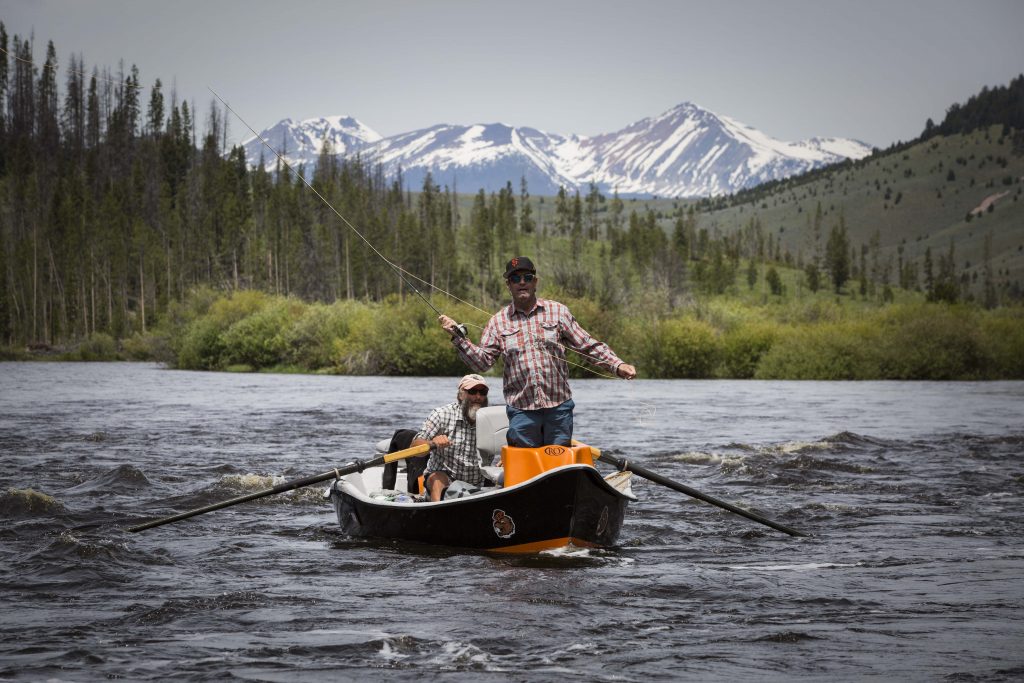
MP: You have to fill the void somehow.
HL: The fans have been amazing—the letters I get. The support I get from people, ordinary people, is amazing. Because when you do this, you don’t think about that. You do it because you’re just writing a song. You’re having fun, and you don’t realize you’re affecting people’s lives. And I get these letters from people who have cancer or they’re debilitated somehow or have life-threatening stuff going on. I was always going so fast, I would never take a chance to really appreciate what that means.
MP: You’ve had a positive impact on your fans’ lives and that’s amazing.
IRONS IN THE FIRE
HL: Yes, it’s very gratifying. And, I have a few irons in the fire. We have a new musical called “Heart of Rock and Roll” that we put up in San Diego, which was a big hit. We sold out six weeks and we’re hoping for a theater in New York on Broadway. We’re working with producers Hunter Arnold and Tom Kirdahy.
MP: Did you write that screenplay?
HL: No, no. This is a friend of mine. My neighbor here in Montana, his son-in-law is a film producer who works for Ron Howard, Brian Grazer, and Imagine Entertainment. And he was up here fly fishing. My neighbor is a big musical theater buff. And he said to his son-in-law, “Tyler, you should do a musical with Huey’s music.” And Tyler did. They went away and wrote this really good screenplay. [Tyler Mitchell and Jonathan A. Abrams].
And immediately we had momentum. We hired a director. We got financing. And it’s good. We’ve been working on it for almost ten years. We’ve got to get in the right theater. It’s very funny, the business of theater in New York. The critics obviously matter a lot in New York. And, you have to get the right theater. If it’s too big and it’s a comedy, the comedy won’t play. If it’s too small, you can’t recoup. And they all have technical considerations. Like they only allow so many musicians. It’s tricky business, but we’re confident in our show, and our co-producers seem confident as well. Fingers crossed.
There’s also a guy doing a documentary on me. He’s an interesting guy called Kurt Kuenne. He did a film called “Dear Zachary” and another film called “Batkid Begins.” He went to USC, he’s super bright. And his flaw is that he grew up in our neighborhood and was a big fan of the band! [Huey laughs] So he wants to do a documentary. He put this sizzle reel together that people really like and we’re off doing that. So that’s good.
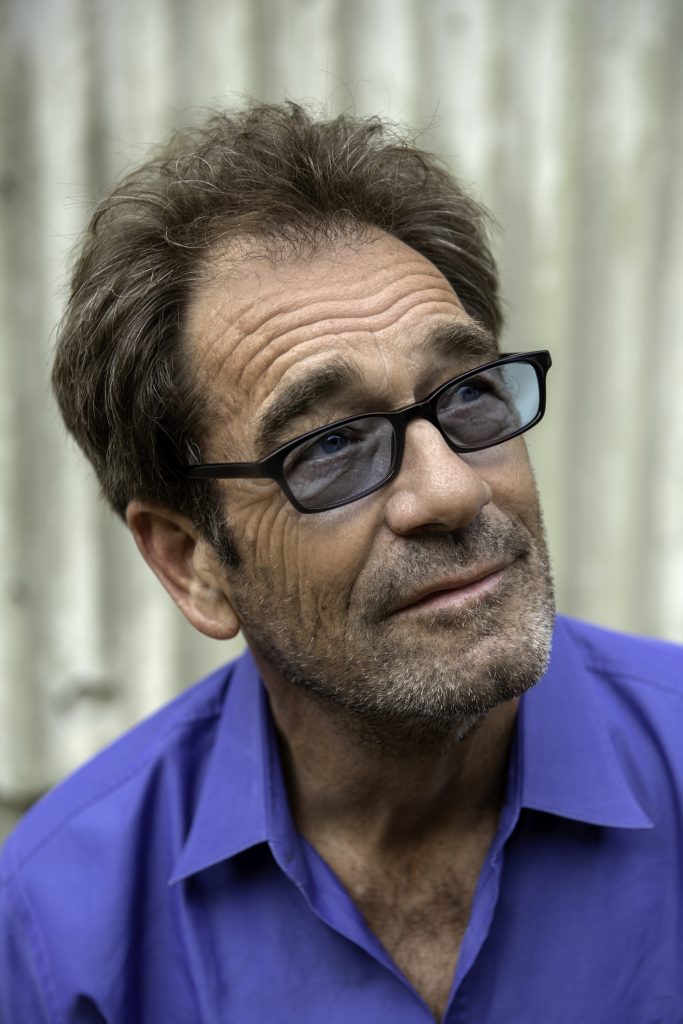
BS: That’s great. Is he spending time on your ranch doing interviews?
HL: He’s already been up there for a couple days. And now he’s coming to New York because I’m going to Scotland Sunday to play in a golf tournament. Then I go to New York to do publicity because I have a new record coming out.
BS: Wow, sweet!
HL: Yes, a brand new record of original songs.
[Listen to his new song, “Her Love is Killing Me.”]
FIRST NEW SONG IN 10 YEARS
MP: Talk to us, I love that! Congrats.
HL: Yeah, it’s called “Weather.” The album probably won’t be released until mid-February of next year, but the first single has just been released digitally (“Her Love is Killin’ Me). And then we have a video that we’ve done which features some great people. Michael Keaton is in it. Jimmy Kimmel, Joe Montana, Bruce Bochy [manager of the Giants], and Brandon Flowers. Brad Paisley mimes the guitar solo, and Andy Garcia lip-synchs a line from the St. Andrews golf course. Sean Hayes from “Will and Grace” and Patrick Warburton [“Seinfeld” actor]did a cameo. They’re funny those two, really funny. And, I mostly just shot everybody with my cell phone. It turned out great.
The album only has 7 songs on it because that’s all we had recorded when my hearing went to crap. We were making a record all this time, slowly but surely. We’re not the most prolific bunch for a lot of reasons. Number one—we’ve written a lot of songs and it’s pretty hard to keep writing. It really is, it’s just hard. And I’m a little older. And I also like to fish, you know what I mean? [laughter] You gotta do some of that.
We were playing 75 shows a year and recording at our leisure, real slowly, because you have to write the songs, and the songs are hard. They just have to come. There’s no way you can conjure them up. And so we had about seven songs done, and I was convinced that we were really as good as we’ve ever been. I was never that good to begin with. I was still improving two years ago.
My theory was that we could stay away as long as we want without a record, as long as we’re this good. And in fact, the longer we stayed away, the better. So we were quietly staying out of the limelight, playing 75 shows and recording an album over the last eight years. And then this happened. So I said, we might as well release the record. So that’s what we’re doing.
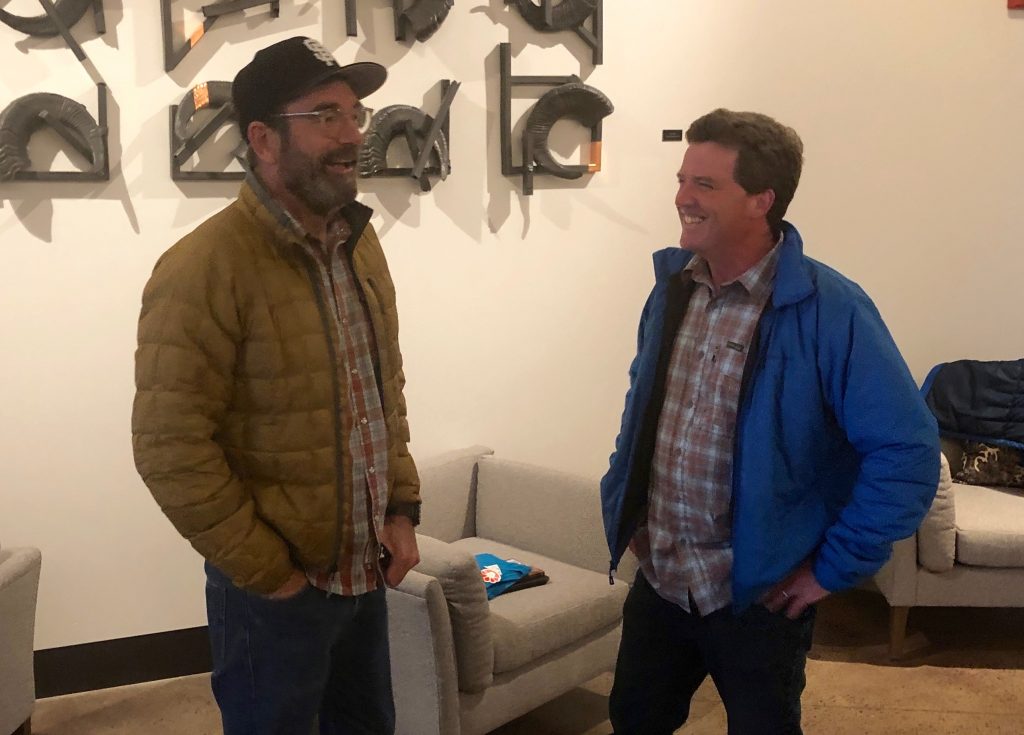
BS: That’s exciting to hear. I didn’t know.
MP: You feel good about that, I’m sure?
HL: Three or four of the tunes are absolutely among our best work. BMG is our label and they’ve been very good so far and we’re all very excited.
MP: Nice to be trending up still. If you’re still improving with your band and you’re writing songs that you feel are really worthy, that must be a great feeling.
PUSHING THROUGH IT
HL: It was great. This [he points to his ear] has ruined everything. This has absolutely ruined everything. I try not to let it get me down. In the first two months of this, I was suicidal. I can honestly share that with you. I thought, shit, I’m just going to commit suicide. I actually contemplated my demise. You know, like pills. I figured pills were the easiest way to go. I mean, would I have? I don’t know.
MP: Did you have vertigo too?
HL: Yes, I had vertigo 35 years ago. I had to cancel a gig. I got so sick I couldn’t move. I said, “Take me the hospital.” They gave me a Thorazine, and I was fine the next day. Then five years later I had another huge vertigo bout, and five years after that another huge vertigo bout. But I haven’t had any vertigo episodes for a long while. My Meniere’s Disease is atypical in that the hearing loss is my main symptom. But, there are always people worse off, and after all I’m still a lucky guy, and it’s important to remember that.
BS: Has it made you more grateful for things in your life?
HL: It has. It’s changed things for me, I read more. When my hearing is really bad, I’m better off by myself. Because there’s nobody that I can’t hear. I’m in my cocoon, and I’m fine. I can read and I have devices to hook up to my phone through my hearing aids. And I have more powerful ones if these don’t work, which I tried to switch to the other day [when we tried the initial conference call]. It didn’t work so well, but I can Bluetooth to the television. I don’t watch much TV. But I watched the Democratic debates. I made myself watch the debates. But that’s it.
MP: Was there an awakening or any moment after those two months that it changed for you?
HL: Well, no, I got better. What happened was I got better for about five days. And then I got crappy again. It’s been really strange. I gauge it one to ten. Ten is what I was before this happened. I wasn’t really a “10” then, of course, because my right ear was only about 30 percent of normal and I was living on my left ear. When I first had my right ear go out about 30 years ago, I went to an old, wise E.N.T.—Ear, Nose and Throat doctor.
The guy looked in my ear and said, “Well, get used to it.” I said “What?!” It felt like I had just gotten out of the swimming pool and my ear wouldn’t clear. And he goes, “Get used to it.” I said, “What do you mean?” He said, “Well, it happens. There’s nothing conjunctive wrong with you. You just lost your hearing. Sometimes it comes back. 66 percent of the time it comes back. But usually in the first two weeks.” I said, “Wow, are you kidding me?” “No,” he says.
“But I’m a musician. I’m a singer.” And he says, “Hey, Jimi Hendrix had one ear. Brian Wilson has one ear. I have one ear and I’m in a barbershop quartet.” I said, “You’re kidding me?” He said, “No.” So I go home. I tell my wife and she says, “You can’t just do that. You have to go get a second opinion.” So I go to UCSF and they test me up and down. And, you know, they couldn’t find it. That’s when the process started. Since that time, I’ve been everywhere, that’s how long I’ve been battling this thing.
I’ve been to House Ear Institute, Stanford Ear Institute, Mayo Clinic. Tom Brokaw, bless his heart, even made some calls for me. I’ve been on the phone with Dr. Steve Rauch. He’s pretty much a mentor for all these guys. Dr. Aaron Tward at UCSF is really my go-to guy and they’re all really super. I’ve tried all the holistic stuff as well. 20 supplements in the morning and 15 at night. Living Ayurveda [Indian alternative medicine]. I’ve done acupuncture and chiropractic. Cranial massage and essential oils. Low salt diet, all organic, no caffeine. I haven’t had any caffeine in two years. No chocolate. But none of it works. [laughter]
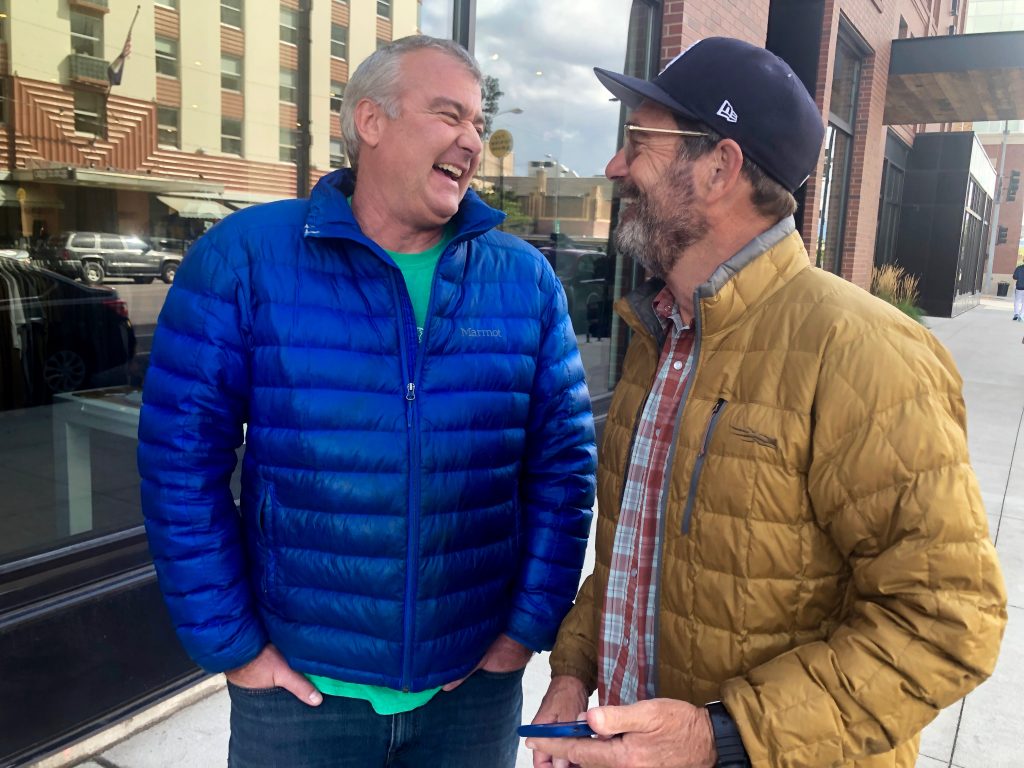
BS: So how do you keep laughing?
HL: I don’t know how I do it. I really don’t. We went fishing the day before yesterday with my neighbor Andy Carlson and my ranch manager Joe and we had a great day on the river and everything. I had fun. I couldn’t hear anything. But I had fun. People say, well, it doesn’t affect your golf game or it doesn’t affect your whatever… but it really does. It affects everything. And when my hearing is good, it feels so good to have good hearing. I just thank my lucky stars and just hope and pray that it stabilizes, which it never does.
BS: Who are your favorite writers?
HL: Tom McGuane is one of my favorite authors in the whole world. Tom McGuane is kind of a new friend. I just love his writing. He’s so literate. Just exchanging emails with him is wonderful. I just read his new story “Wide Spot” in The New Yorker. And what’s so fascinating about him is he’s a really a Western writer, he sees himself as a Western writer. And a lot of people don’t get that because some of these characters are so off-the-wall, but that’s the way they are in the West. That’s the way they are.
MP: I just read “Cloudbursts,” his book of short stories. It’s fantastic.
HL: He really is one of the best short story writers ever.
MP: He does a great job painting the picture. You feel like you are in there and it is a truly Western voice.
HL: And I’ve fished a little with Carl Hiaasen and love his work.
THE CREATIVE JUICES
BS: Are you doing any writing yourself?
HL: I wrote a song for the new musical. The director said it’s the protocol in a musical for the lead character to sing a song early in the play that articulates what it is that he or she wants. What are their goals? And then boom! I had this idea on the way home. It’s the last idea I’ve had. [laughter] And we wrote it up and it’s great. It’s called “Be Someone” and it’s a really good song. It’s the centerpiece of the musical.
I think about writing other stuff. My mother was this amazing character. Her story needs to be told. She was kind of a famous character in Bolinas, California, which is a coastal town, north of San Francisco, that’s stuck in the ‘60s. You know, it still is. This is where Richard Brautigan lived before he moved to Montana, where McGuane lived before he moved to Montana. Joel Coen and Frances McDormand. So I’m trying to do that, and I should really try and do that. But, you know, writing is really hard work.
BS: Sure is.
HL: I have another project that I’m working on. It’s a TV show that I have an idea for. I have a producer who’s excited about it. So we’ll see.
It’s it kind of a partially scripted, partially improvised show. In it, I’m me, Huey Lewis. My professional life is exactly the same as my real professional life. But my personal life is not. I don’t live in Montana. I live in Hollywood. I have a pushy manager named Morrie and now I have hearing loss, so I can’t sing anymore. Morrie’s always trying to figure out ways that I can make some money. Reality shows, public appearances, ignominious endorsements, etc., and I’m trying to keep my dignity through all this.
[Huey goes into great detail about this project, sketching out scenes from several episodes.]
BS: It sounds hilarious! You seem to be having a blast with that. So you have this all sketched out, all these episodes?
HL: I have the first episode written. But honestly, It’s a long shot. You know the thing that’s wrong with it? I’m probably too old, to be honest.
BS: Yeah?
HL: Probably like ten years too old.
BS: Young at heart.
HL: But, you know, we’ll try.
MP: Yeah, you have to give it a good try.
HL: And I think I can act even when my hearing is this bad. Once we have a script, I don’t have to actually hear. And I’m almost hearing you. I’m hearing you.
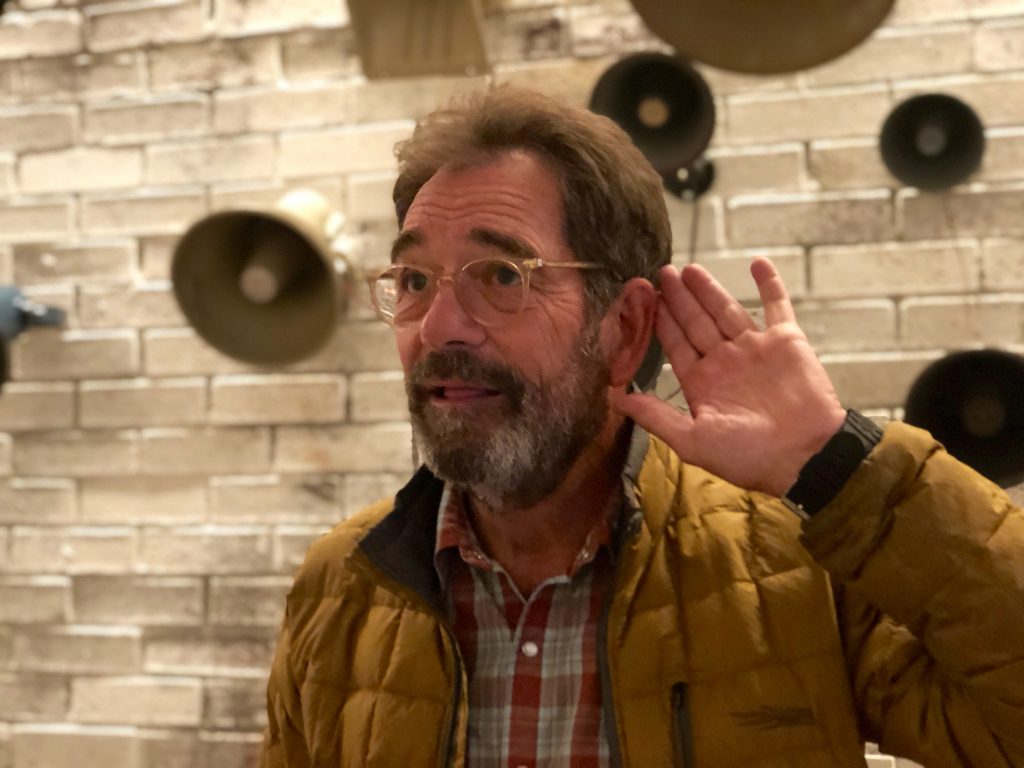
BS: We read a story about you hitchhiking across the country and flying to Europe. Was there an awakening for you where you said, “Man, I’m gonna be a rock and roll star.”
HL: Yeah, that was it. When I went to Europe.
As I said, my mom was a hippie. She’s an artist. Born in Poland, escaped during the war, was a commercial artist in New York, and then dropped out. We moved to Marin County in 1955. And she hung out with all the beatniks like Allen Ginsberg and Timothy Leary and took LSD early and all that sort of stuff. And my dad was worried about me because, you know, I was 11. He convinced me that I should go away to prep school on the east coast. I was a year young because I had skipped second grade. He told me, if you want to do this, you’re going to have to talk to the court yourself. And I did.
So I took my dad’s advice, and we had a contentious day in court. But the judge ruled that I would be allowed to go to this school even though my mom had custody. And then I turned 12 years old. I graduated from eighth grade in June of 1963, turned 13 in July, and in August I went away to prep school for four years to The Lawrenceville School in New Jersey. Coat and tie, all boys, and neither one of my parents ever visited there. So, you know, that was it for me. And it was tough, man, at first. I didn’t particularly enjoy it. Now I’m very glad I went there. But after four years, I was accepted to Cornell and was going to go to the engineering school. I had a kind of a math aptitude that I cared very little for. [Huey scored a perfect score on the Math section of the SAT]
TEACHERS
BS: Was there any teacher who particularly influenced you?
HL: My English teacher Jim Waugh. He really gave me a lot of confidence to choose my own path. I mean I was basically raised by the school. Mr. Waugh was a huge influence. He taught me that I could make my own life. When I have a choice to make, I often think of him and wonder what he would do.
MP: Did you have any sense of where you wanted to go after prep school?
HL: I remember when I was a junior, my college placement advisor asked me, “Well, what do you want to be when you grow up?” The right answer would have been, “How should I know? I’m 15.”[laughter] He says, “Well, you got great grades in math.” I had 800 on my math boards and he said, “Well, how about engineering?” And I literally thought that engineers drove trains
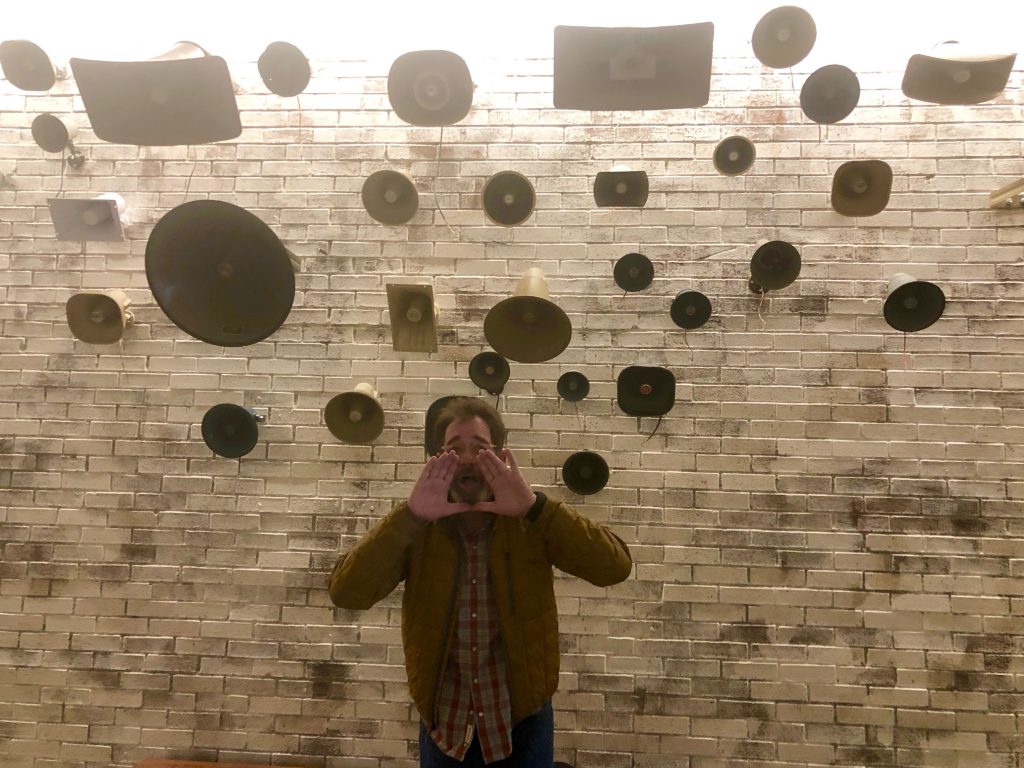
I didn’t know anything. He mentioned Cornell, which is a great engineering school and in the Ivy League. And his job, I now realize, was to place as many people in the Ivy League schools as he could. And he saw me as a math guy, a perfect guy for Cornell. So bingo, I applied to Cornell, I was accepted.
And when I came home from school on a vacation, my dad said, “Okay, you’re 16 years old, and, as far as I’m concerned, you can do whatever you want to do in life. Your decisions are your own. I’m only going to make you do one more thing.” So what’s that? He says, “Don’t go to college. Not yet.” I said, “What do you mean, Dad?” I’m going to play baseball and I’m going to go to Cornell. He said, “Just take a year off and bum around Europe.” I said, “You’re kidding me?” “No. Do it.”
BS: He was ahead of his time with that kind of thinking.
HL: So I did. I worked for two months at a stock brokerage, made $600 and hitchhiked across the country. A guy showed me how to stowaway on an airplane. I didn’t stow away, but I did the ticket trick. It’s a long story. [laughter] Basically, I flew there for free and then bummed around and played harmonica throughout Europe for a year.
At one point I was in North Africa. I’m in Tangier. I’m in the square. I’m playing harmonica. I get three Dirhams. The youth hostel cost one Dirham. All I can eat was another Dirham. And I had a Dirham to the good. I’m a musician! I’m making money. And then, I lost my passport. It’s kind of a really funny story, man. After being in Morocco for like two months, in Casablanca. I couldn’t get out, too stoned. Couldn’t leave. [laughter] Yeah, we’ll leave tomorrow!
MP: Mañana
ON THE ROAD
HL: Yeah, mañana. And then I finally got out and I’m hitchhiking out of Morocco. I’m in Spain now and this 80-year-old guy with a handlebar mustache in a ‘30s Ford pickup with an Airstream trailer—he was a crazy Dutchman—he picks me up and we stopped at every bar on the way to the Portuguese border. Finally he got so hammered, he drove off this little dike into the water. And the water flooded the car and the Airstream. And I thought, ‘We’re screwed here.’ He got out, took a fire extinguisher, and squirted the distributor. The thing started up and we drove out. But when we got to the border that night, my passport was missing. And later I find out it had floated out of the truck, so I couldn’t go across the border.
So he went across without me and I just had my knapsack and my sleeping bag. I was going to go back to Seville to the consulate and get a new passport. It’s night and I’m right in this little Spanish border town across from Faro, Portugal. I have my sleeping bag. I’m just going to roll it out and sleep, but I hear music coming from this garage. I go look, and it’s some band—some Spanish guys playing back there, practicing their band. I knock on the door and they see me. And bingo, I teach them “Louie, Louie” or something. And we end up jamming. And then I ask them, can I sleep right here? “Sure,” they say. So I sleep right there.
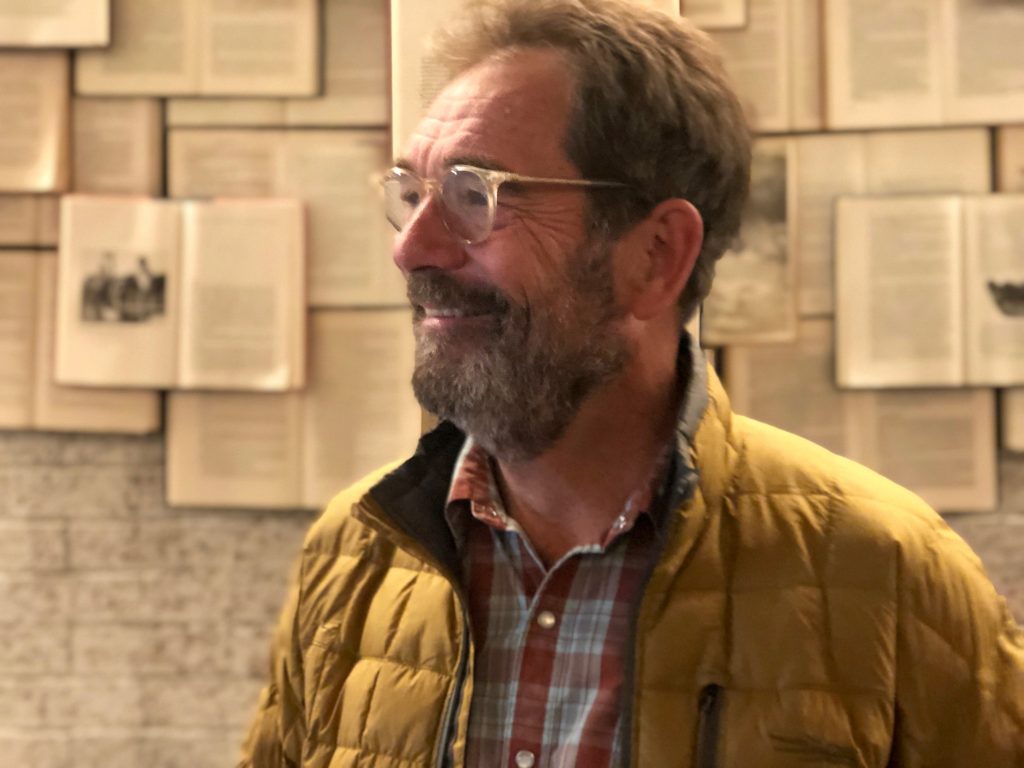
And then in the morning, I go to the consulate. It’s Friday and it takes me all day to get there. And I get there right at five o’clock and they basically shut the door on my face. So I go into town, hitchhike back into Seville, and I find a night watchman there and ask him, “Can I sleep here?” “Yeah, you can.” And then these students find me later. And they say, “What are you doing?” I’m playing harmonica. I was playing on the street. And I tell them my story. I have no money and I need 20 bucks for my passport. So they decide they want me to do a concert—“Los Blues Huey Lewis” [he says in Spanish accent]. They’re communist art students and they put up these posters and make me look like this amazing rock star.
And they find a guitar player. I got a harmonica. He knew a few blues changes [Huey harmonizes chord progressions] and a minor chord, and so we worked up maybe six or seven songs. The concert was sold out. When we went on stage it was pin-drop quiet. First time I ever heard it that pin-drop quiet. And we start to play and it’s pin-drop quiet, right? I start singing and I think, I’m either dying here or they’re really listening. I didn’t know what the hell was going on. And at the end, the crowd just goes wild. Well, after the show I get business cards from people and money—there was like $100 there. So I thought, wow, this is great! So the students said, let’s go to dinner and celebrate. I said, absolutely! So we go to dinner. And oh my god, there were 15 or 20 of us and we order dinner and Grappa and everything. When it comes time for the check, I had $20 left to get my passport.
But the bug had bit. So I went through these cards and there was another guy who had a club. So I called him up. He said, “Sure, you want to play Friday night?” I only had four harmonicas with me and they were getting out of tune. And you can’t buy Hohner harmonicas in Seville, Spain in 1969. And we go on in this little club and we’re horrible. We’re so bad—the harmonica is out of tune and the guitarist breaks a string. We’re just terrible. And it was the end of the deal.
But now, the bug had bit—so I got back to Cornell and I joined a band. I’d had the first year of Cornell almost done because of Advanced Placement in prep school, so I didn’t even have to go to class hardly. I just went and played in bands. Then by my second year, the student uprisings had happened. The Afro-American Student Society took over Willard Straight Hall. You could take classes pass/fail. It didn’t catch up with me till midway through my sophomore year. Then I went [he gestures “good bye”].
BS: See ya later.
MP: Then it was time to hit the road with your harmonica?
HL: Yeah. I dropped out of school, went back to California. It was now late ‘69. And I joined a big bluegrass band, four of whose members were from a band called Clover. Then they recruited me to join Clover and we were signed by Jake Riviera and Dave Robinson of Stiff Records. They had Elvis Costello, Nick Lowe, Graham Parker and the Rumour, all that. We were the only band they had that didn’t happen. [laughter]
It was funny. We were a kind of a country-rock band. They moved us to England. We lived in London for two years. And because London was between fads—there’s always the new thing—they thought it was going to be country-rock, and, of course, Clover was the essential country-rock band. We got signed by phone and flew over. And literally that week, the Clash played their first gig.
I learned my craft in London basically. The punks were so helpful for me because I have this rough voice—this voice that was not radio worthy in the ‘70s. I just didn’t have a radio voice. I barely sang with Clover, I just played harmonica. What I saw with the punks was these guys basically thumbing their nose at the music establishment. Saying hey, we’re writing our own songs. We’re singing them our own way. We don’t give a shit. Yeah! I thought. Wow, how liberating.
DO MY OWN THING
So when Clover broke up, which we did after two unsuccessful records in London, I said, I’m going to do my punk thing. I’m just going to go back and start a little R&B band and play in my local club. And I don’t care what happens. I handpicked my favorite guys. Which was Johnny, Sean, Bill, Chris, and Mario. They were all in other bands and I said, stick in your bands, but if I get something happening, let’s play. It’s a long story—30 years old. $300 to my name. [laughter]
MP: Then you’re on top of the world.
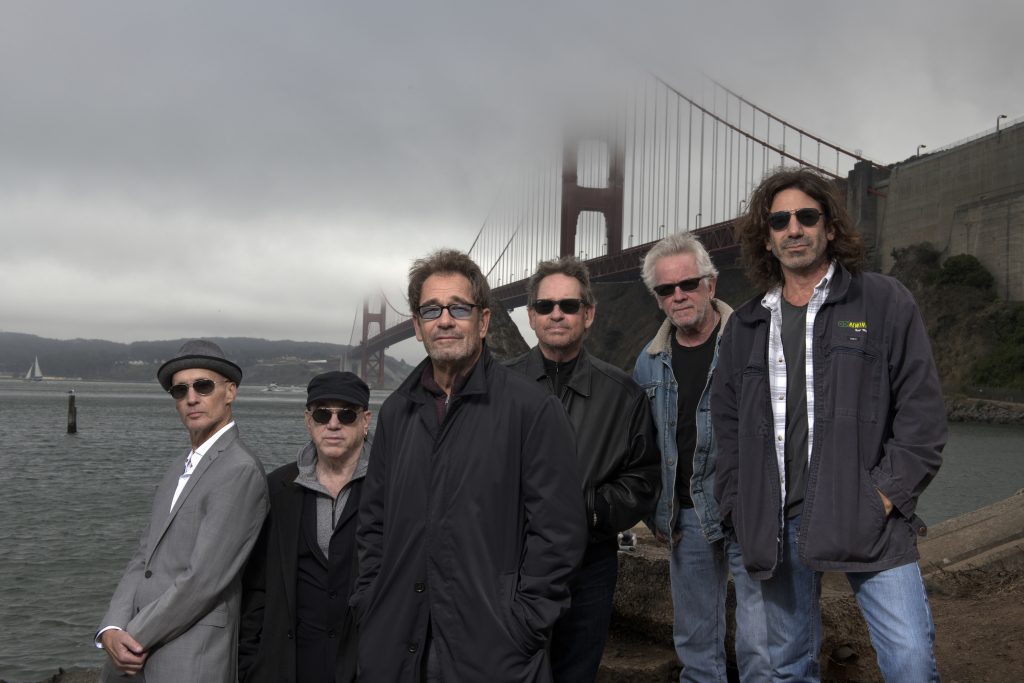
HL: My only regret is, I was pretty ambitious back then, and you kind of have to be. I probably didn’t enjoy it—well, yeah, I don’t know. I guess I did. I guess I did.
BS: Enjoy it just in terms of working so hard and so fast?
HL: No, I take that back. Because I remember distinctly when our first record didn’t do anything. We went on tour with the Doobie Brothers, who were friends, and still are. It was all we could do to get finished with a set without being booed. We would go immediately from song to song because if we paused, they would boo and start throwing shit.
We toured in San Antonio with the Doobies and I played our set. When we were done and they went on, I went out into the hall to watch from the very back. I had never done that. So I go to the back of the hall while they’re playing. It’s dark. I have a hat; nobody can see who I am, even though I’d been on stage. There are some empty seats up there. And now Pat Simmons gets to the place in the set where he goes, “Hey, thanks!1 Great to be here! We are the Doobie Brothers. Man! Really great to be here. How about a hand for our opening act today, Huey Lewis and the News!” And this guy next to me yells, “Boo! They suck!” [laughter]
But that was the Doobie Brothers tour for our first album. Our second album, we had a minor tickle with “Do You Believe In Love?” But the second single died,—sold 250,000 copies, which wasn’t great for its time. And the third album was “Sports.” And our first single went top 10. “Heart and Soul” was released in September of ‘83 and went top 10. Then the next single was probably “Heart of Rock & Roll” or “I Want A New Drug”—one or the other—and it became apparent it was going to be a hit. And I went, ‘Wow if that song is a hit?’ Then we got five others!
After the Doobies, once we started to gain a little momentum, we got offered a tour with Toto. And Toto were kind of our heroes because they’re such great musicians. Steve Lukather is still a good pal of mine. They were heroes of ours. Great musicians. And we had four shows booked with them. But after we played in Tulsa, and they kicked us off the bill!
A reviewer had written, “Toto was there, but Lewis was the news” or something like that. It wasn’t like we had kicked their ass, it was just a reviewer’s take… And they kicked us off the fucking bill. And these guys were totally big. I’m going, ‘Oh man, really?’
So it’s like a year or so later, and our Sports record had just come out, and we had a hit. At that point, we were opening up for 38 Special and tearing ‘em up because half the people were coming to see us. We would do a couple of encores and could have done more. And 38 Special were real men about it. They came out every day and watched our set from the side. Donnie Van Zant would watch our set. I always tip my hat to them for that. Yeah, I love that.
I knew we were on a roll and so I convened the band. I gathered the boys and I said, “Guys, enjoy this because this right here is as good as it gets.” I pointed out that when we get to be headliners ourselves, which is going to happen in about six months, on our next tour, we’re going to have to worry about the lights. We’re going to have to worry about the sound. We’ll have to have all these trucks. It ain’t gonna be near this easy. And we’re gonna have some young opening band trying to kick our ass. This is as good as it gets. And it was. It was a gas.
###
Subscribe to Whitefish Review or order a copy of issue #24 “Awakenings & Our Teachers,” containing the Huey Lewis interview and 45 writers, artists, and photographers. Did you notice we have no annoying ads? Please donate to our non-profit project to keep the arts flowing. Thank you!

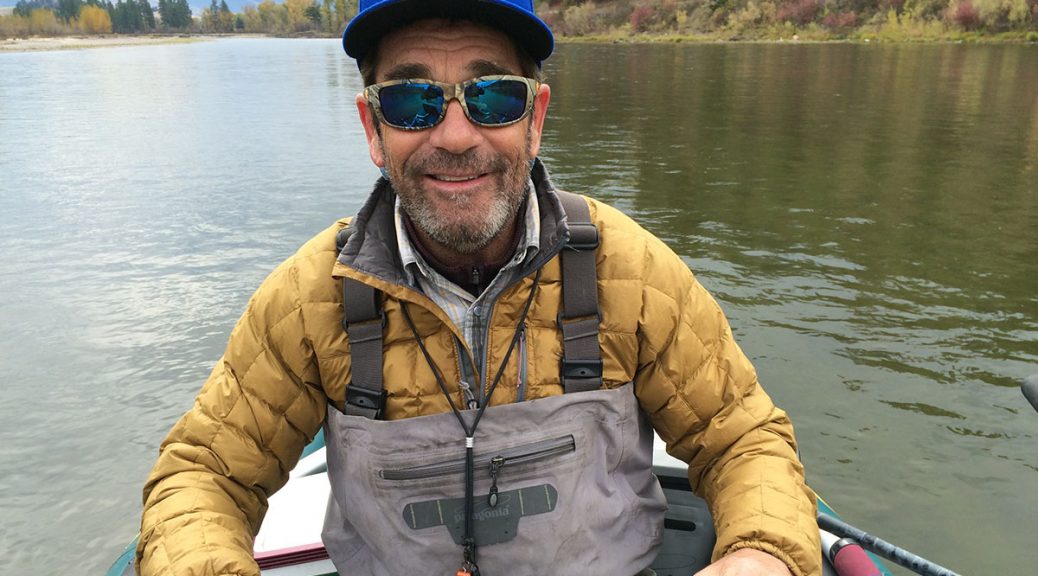
Excellent interview, thanks. Absolutely broke my heart to read Huey was suicidal. I did write him a letter and I hope it helped him. I have loved him and the band for over 35 years. It makes me very sad to have it end this way. But they did make a difference in my life. I love the new songs and I will continue to support them forever.
Hey guys,
I grew up in Marin with the Huey and the news. Our paths crossed several times. But Im writing to let you know about http://www.donvachini.com. A world record holder of many tippet class fish. A fantastic writer and fly fisherman. Award winning photographer and also my brother-in-law. If you get a chance check his site. You’ll enjoy it! Best of luck Huey.
I would like to thank the journalists for putting together an amazing interview! A special You Rock award goes out to Huey Lewis for sharing his story. I cannot tell you how much this means to me as I too suffer from Meniere’s Disease, and I too have had days so bad that I thought about simply going away to find a better place. Thank God that both Huey and I are still here to fight the good fight. Bringing his struggles to light and reading how he continues to try and find positive ways to work through it provides motivation and inspiration to all of us who just want to experience more good days. In addition, it says to others who may not know this disease but who have similar symptoms to read more about Meniere’s and tell your doctors to check for that. I struggled for over a year with no diagnosis from multiple doctors before I went to a specialist in Missoula who was able to recreate my vertigo in his office and that lead the his team to confirm I have Meniere’s. They say that Knowledge is Power, thanks to Huey I am now able to speak about this and know that it’s “Hip to be Square.” God Bless you!
Great article. The story he tells is really so personal and yet so relatable for anyone, with or without hearing issues.
Hope Huey takes great comfort in knowing that the bands influence is worldwide and that even down here in Australia the 1989 tour was great and a highlight for anyone who saw it.